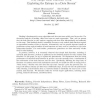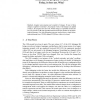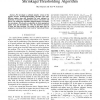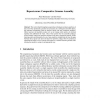34 search results - page 2 / 7 » When and Why Ruppert's Algorithm Works |
SODA
2008
ACM
13 years 6 months ago
2008
ACM
Hashing is fundamental to many algorithms and data structures widely used in practice. For theoretical analysis of hashing, there have been two main approaches. First, one can ass...
ESEC
1999
Springer
13 years 9 months ago
1999
Springer
Imagine some program and a number of changes. If none of these changes is applied (“yesterday”), the program works. If all changes are applied (“today”), the program does n...
TSP
2010
12 years 12 months ago
2010
We investigate a subband adaptive version of the popular iterative shrinkage/thresholding algorithm that takes different update steps and thresholds for each subband. In particular...
KDD
2004
ACM
14 years 5 months ago
2004
ACM
Procedures for collective inference make simultaneous statistical judgments about the same variables for a set of related data instances. For example, collective inference could b...
GCB
2010
Springer
13 years 3 months ago
2010
Springer
: The current high-throughput sequencing technologies produce gigabytes of data even when prokaryotic genomes are processed. In a subsequent assembly phase, the generated overlappi...




